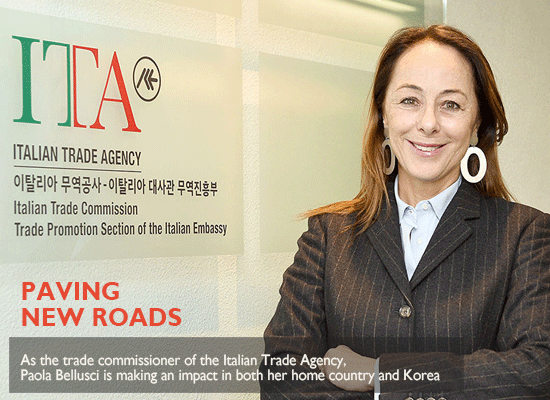Feature Stories
- Home
- Why KOREA
- Feature Stories

As the trade commissioner of the Italian Trade Agency, Paola Bellusci is making an impact in both her home country and Korea
When Paola Bellusci first moved to Korea, she admits she didn’t know much about the country. Now, four years later, the trade commissioner of the Italian Trade Agency (ITA) says she has fallen in love with Korea and feels right at home. A native of Naples, Bellusci professes her deep passion for strengthening economic and cultural ties between the two countries. Most notably, her biggest goal during her term here in Seoul is to deepen knowledge and foster understanding between Koreans and Italians. Bellusci believes such an understanding will open up new roads of cooperation and translate into more fruitful business opportunities. Here’s what she had to say about Korea-Italy ties.
What is the ITA and what is its role here in Korea?
ITA was born in 1926 to help Italian companies enter overseas markets. It first focused on exporting agricultural products but soon evolved and now deals with trade promotion. We have 67 offices overseas and opened up an office here in Seoul in 1979. In the Seoul office, we help Italian companies have access to market opportunities here in Korea, and vice versa. We also respond to inquiries that come from Korea companies and connect them with Italian businesses.
We are implementing a number of promotional programs funded by the government, which include trade shows, seminars and exhibitions. For example, we bring Italian fashion companies to Seoul twice a year and connect them to Korean buyers. We also invite more than 200 Korean companies to trade shows in Italy. In March, we’re launching a project with Galleria Department Store to promote Italian fashion.
What kinds of Italian companies are seeing popularity in Korea?
It may sound surprising since Italy is known mainly for fashion, food and luxury cars, but the machinery industry is the backbone of Italian exports. Another industry that is flourishing is the leather industry. There is a growing appreciation for Italian leather products coming from Korea. My personal interpretation of this phenomenon is that Korean consumers are growing tired of big name brands; they’re looking for something that’s more unique and high quality.
Why do you think Italian companies are attracted to the Korean market?
The size of the Korean market is appealing to Italian companies because Italy’s industrial system is mostly comprised of small and medium-enterprises so it’s a much better fit for them. Also, Koreans really appreciate products made in Italy because they have a very good eye for design.
Personally, I think Italian companies should come here and experience Korea because it’s a country that grows and develops every single day. Every day is different and you can actually witness firsthand the country’s progress. It’s so exciting.
Trade between Korea and Italy is quite active, but bilateral investment isn’t as strong. Why do you think this is?
I would like to see investment activity grow between Italy and Korea because it’s rather low compared to trade. In 2016, there have been 13 cases of Italian investment to Korea, totaling USD 41 million; half of it was in manufacturing and the other half was in the service industry. From January to September 2017, Italian investments in Korea totaled USD 54 million. Meanwhile, bilateral trade between our countries stood at about USD 10 billion in 2014.
In the case of Italy, the average size of an Italian company is rather small so they lack the financial capacity to invest abroad. Of course, that’s not to say there aren’t significant Italian investments. One of the largest Italian groups called Eni opened a big plant with Lotte Chemical in Yeosu—this is the largest investment in Korea. There was another joint venture in 2015 between Italian makeup manufacturer Intercos and Korea’s Shinsegae. I hope that such joint ventures can take place more often in the future.
How big of a concern do you think North Korea is to Italian companies?
I think that some Italian companies are more concerned than they should be. This, of course, is not their fault because the Italian media has generally represented the issue in a way that is not very realistic. There were some instances where Italian companies have cancelled tourism and business trips to Korea and I find this to be very unfortunate because they missed opportunities to do great business with Korean companies. Not even for a fraction of a second have I felt unsafe or insecure living in South Korea. I want Italian companies to know that it’s always been business as usual and it’s very safe here.
What advice would you give Italian companies wanting to do business in Korea?
My suggestion to Italian companies is a very basic one—come and be present. They need to actually see and participate in shows and programs to establish a close relationship with Korean partners. I think that it’s important to plan business trips to Korea because Korean clients see this as commitment. Also, don’t underestimate the power and value of Korean small and medium-businesses because innovation starts with them.
By Esther Oh (estheroh@kotra.or.kr)
Executive Consultant/Invest Korea










